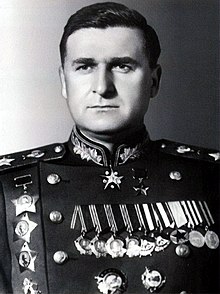You can help expand this article with text translated from the corresponding article in Russian. (December 2020) Click [show] for important translation instructions.
|
Vasily Sokolovsky | |
|---|---|
 Sokolovsky in 1946 | |
| Born | July 21, 1897 Kozliki, Russian Empire |
| Died | May 10, 1968 (aged 70) Moscow, Russian SFSR, Soviet Union |
| Buried | Kremlin Wall Necropolis, Moscow |
| Allegiance | |
| Service | Red Army |
| Years of service | 1915–1962 |
| Rank | Marshal of the Soviet Union (1946–1962) |
| Commands | 43rd Rifle Division Western Front Chief of the General Staff |
| Battles / wars | |
| Awards | Hero of the Soviet Union Order of Lenin (8) Order of the Red Banner (2) Order of the October Revolution Order of Suvorov, 1st Class (3) Order of Kutuzov, 1st Class (3) |
Vasily Danilovich Sokolovsky (Russian: Васи́лий Дани́лович Соколо́вский; July 21, 1897 – May 10, 1968) was a Soviet general, military theorist, Marshal of the Soviet Union, and a commander of Red Army forces during World War II. As Georgy Zhukov's chief of staff, Sokolovsky helped plan and execute the Battle of Berlin. He also served as head of the Soviet Forces in East Germany and the Soviet Chief of the General Staff.
Born to a Belarusian peasant family in Grodno in the Russian Empire, Sokolovsky joined the Red Army in 1918 and served with distinction in Central Asia during the Russian Civil War. He held a number of staff positions, eventually becoming Deputy Chief of the General Staff at the start of the German invasion of the Soviet Union. In late 1941, he helped coordinate the Soviet counter-offensive at the Battle of Moscow and drove German forces from the capital. As commander of the Soviet Western Front, he then took part in the Battle of Kursk and Operation Kutuzov. In April 1944, Sokolovsky was named chief of staff of the 1st Ukrainian Front under Georgy Zhukov, a position he served until the end of the war. In that capacity, he helped execute Zhukov's capture of Berlin.
After the war, Sokolovsky was named deputy commander-in-chief of the Soviet Forces in Germany until July 1946, when he was promoted to commander-in-chief and head of the Soviet Military Administration; he was also named a Marshal of the Soviet Union. In 1949, Sokolovsky became the Soviet Deputy Minister of Defense, and in 1952 he was made Chief of the General Staff. He had effectively retired by 1960 but achieved renewed international fame with his volumes on military strategy. Sokolovsky died in 1968 at the age of 70.